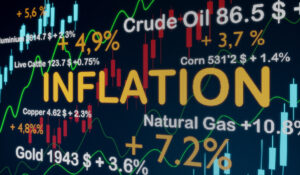Why the Definition of Inflation Matters
The comments below are an edited and abridged synopsis of an article by Michael Maharrey
When people talk about inflation today, they generally mean rising prices as measured by the CPI. But historically, inflation was defined as an increase in the amount of money and credit causing advances in prices.
The Fed (and all global central banks) constantly inflate the money supply as a matter of policy. After all, the inflation target is 2%. In fact, inflation is a stealth tax.
The inflation tax is the primary way the US government finances its deficit spending. It spends billions of dollars, but doesn’t collect enough taxes to cover its costs so it has to run deficits. The Fed monetizes those deficits. In effect, it prints money. They call it quantitative easing, but they’re just inflating the currency. As the money supply grows, prices rise and we feel the pain at the grocery store or the gas station. The government is getting bigger and bigger, and families across North America bear the burden through higher prices.
The government loves the inflation tax because it never has to accept responsibility for levying that tax. It can blame it on all kinds of other factors like corporate greed, the pandemic, or oil price shocks.
This is especially true if you redefine inflation as simply rising prices. You lose the ability to parse out the effect of monetary policy.
If we use the traditional definition of inflation (an expansion of the supply of money), the culprit is clear. The Fed and the government expand the money supply. If you accurately define inflation, you know exactly who’s to blame. But if the government can fool people into believing that one effect of inflation is inflation, they can blame it on everybody but themselves.
“This is not to say price shocks and other factors don’t cause prices to rise. This is not to minimize the effects of those price increases on our lives. The point is it’s important to distinguish inflation—an increase in the money supply causing a general rise in prices—from other factors driving prices higher. Without a precise definition, we lose our ability to talk about the phenomenon of rising prices and monetary expansion with any precision. And the government gets away with harmful policies.”

